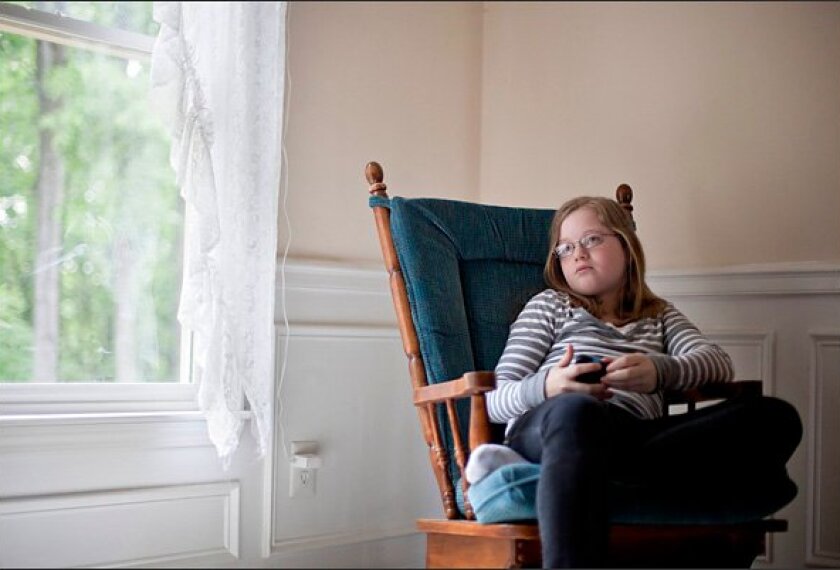When a Georgia middle school student reported to police and school officials that she had been bullied on Facebook, they told her there was not much they could do because the harassment occurred off campus.
So the 14-year-old girl, Alex Boston, is using a somewhat novel strategy to fight back: She’s slapping her two classmates with a libel lawsuit.
As states consider or pass cyberbullying laws in reaction to high-profile cases around the country, lawyers and other experts say many of the laws aren’t strong enough, and lawsuits such as this one are bound to become more common.
“A lot of prosecutors just don’t have the energy to prosecute 13-year-olds for being mean,” said Parry Aftab, a lawyer and child advocate who runs stopcyberbullying.org. “Parents are all feeling very frustrated, and they just don’t know what to do.”
Almost every state has a law or other policy prohibiting cyberbullying, but very few cover intimidation outside of school property.
Alex, who agreed to be identified to raise awareness about cyberbullying, remembers the mean glances and harsh words from students when she arrived at her suburban Atlanta middle school. She didn’t know why she was being badgered until she discovered the phony Facebook page: It was her name and information, though her profile picture was doctored to make her face appear bloated.
The page suggested Alex smoked marijuana and spoke a made-up language called “Retardish.” It was also set up to appear that Alex had left obscene comments on other friends’ pages, made frequent sexual references, and posted a racist video. The creators also are accused of posting derogatory messages about Alex.
“I was upset that my friends would turn on me like that,” she told the Associated Press. “I was crying. It was hard to go to school the next day.”
Murky Legal Issues
Alex learned of the phony page a year ago and told her parents, who soon contacted administrators at the 1,000-student Palmer Middle School and filed a report with the Cobb County police.
“At the time this report was taken in May 2011, we were not aware of any cyberbullying law on the books that would take her specific situation and apply it to Georgia law,” said Sgt. Dana Pierce, a Cobb County police spokesman.
Police encouraged Alex’s family to report the fake account to Facebook. The family said that despite requests to Facebook to take the page down, the company did not do so. The website was taken down around the time the lawsuit was filed last month in Cobb County Superior Court.
Facebook spokesman Andrew Noyes and Cobb County school officials declined to comment on the case. The two students named in the lawsuit haven’t hired a lawyer, and their parents couldn’t be reached for comment.
The thorny issue of whether schools may censor students who are off campus when they bully others online has led to split decisions in federal courts. Administrators and judges have wrestled over whether free-speech rights allow students to say what they want when they’re not at school.
Justin Layshock of western Pennsylvania was suspended after he created a MySpace parody in 2005 that said his principal smoked marijuana and hid beer behind his desk. The suspension was overturned by a federal judge, who found that school officials had failed to show that the student’s profile had disrupted school operations. The judge’s decision was later upheld by an appeals court.
In West Virginia, Kara Kowalski sued school officials after she was suspended from her high school for five days in 2005 for creating a Web page suggesting another student had a sexually transmitted disease. A federal appeals court upheld the suspension, dismissing Ms. Kowalski’s argument that the school shouldn’t punish her because she had created the site at home.
The U.S. Supreme Court declined to hear either case.
Jason Medley, of Houston, filed a defamation lawsuit about a year ago against three of his daughter’s classmates. The classmates were accused of filming themselves making false sexual remarks about his daughter and posting the video on Facebook.
The complaint was later settled with apologies from the girls and a small donation to charity, Mr. Medley’s lawyer, Robert Naudin, said.
“The girls involved likely now understand the wrongful nature of what they did and the harm that can come of such conduct,” Mr. Naudin said. “They made a donation out of their allowances to a charitable organization that fights against cyberbullying.”
Expanding the Laws
In Georgia, lawmakers have given school administrators new powers to punish students if they bully others at school, but legislation that would expand the laws to include text messages and social-media sites never reached a vote this year.
Thirteen states specify in their bullying laws that they have authority over off-campus incidents if they disrupt the school environment, according to an analysis from the U.S. Department of Education published last December. Georgia, however, is not one of them.
“Cyberbullying really goes beyond the four walls of the school or the four corners of the campus, because if you use a cellphone, [personal digital assistant], or social-media site, then those activities follow the child both into the school and out of the school,” said House Minority Leader Stacey Abrams, a Democrat from Atlanta who co-sponsored the legislation that would have expanded Georgia’s bullying law.
“It’s important for the state to really get ahead of this,” Ms. Abrams said. “It’s already happening, but it’s going to be more exacerbated and more difficult the longer we go.”
Alex and her family have started a petition to encourage lawmakers to strengthen Georgia’s law. Her lawsuit seeks a jury trial and unspecified damages.
“At first blush, you wouldn’t think it’s a big deal,” said Alex’s lawyer, Natalie Woodward. “Once you actually see the stuff that’s on there, it’s shocking.”





